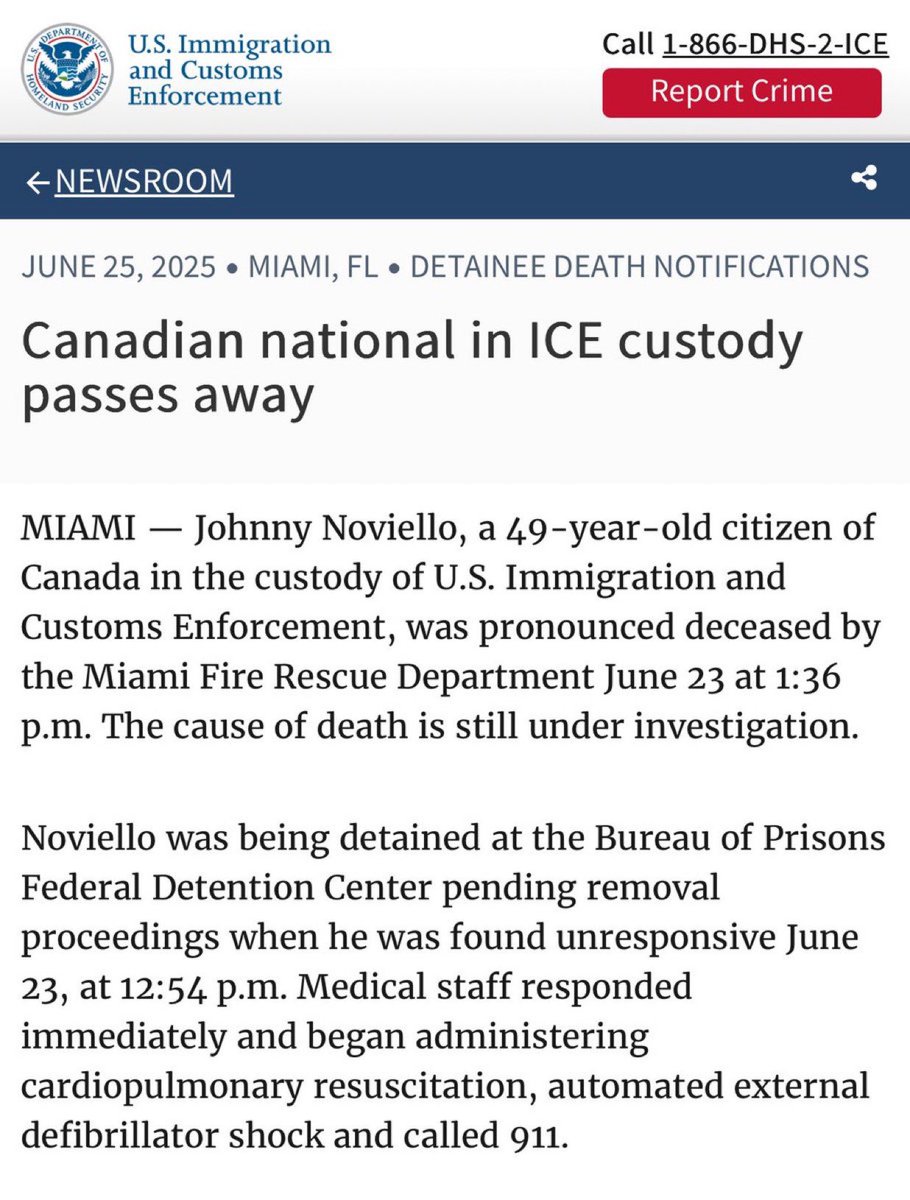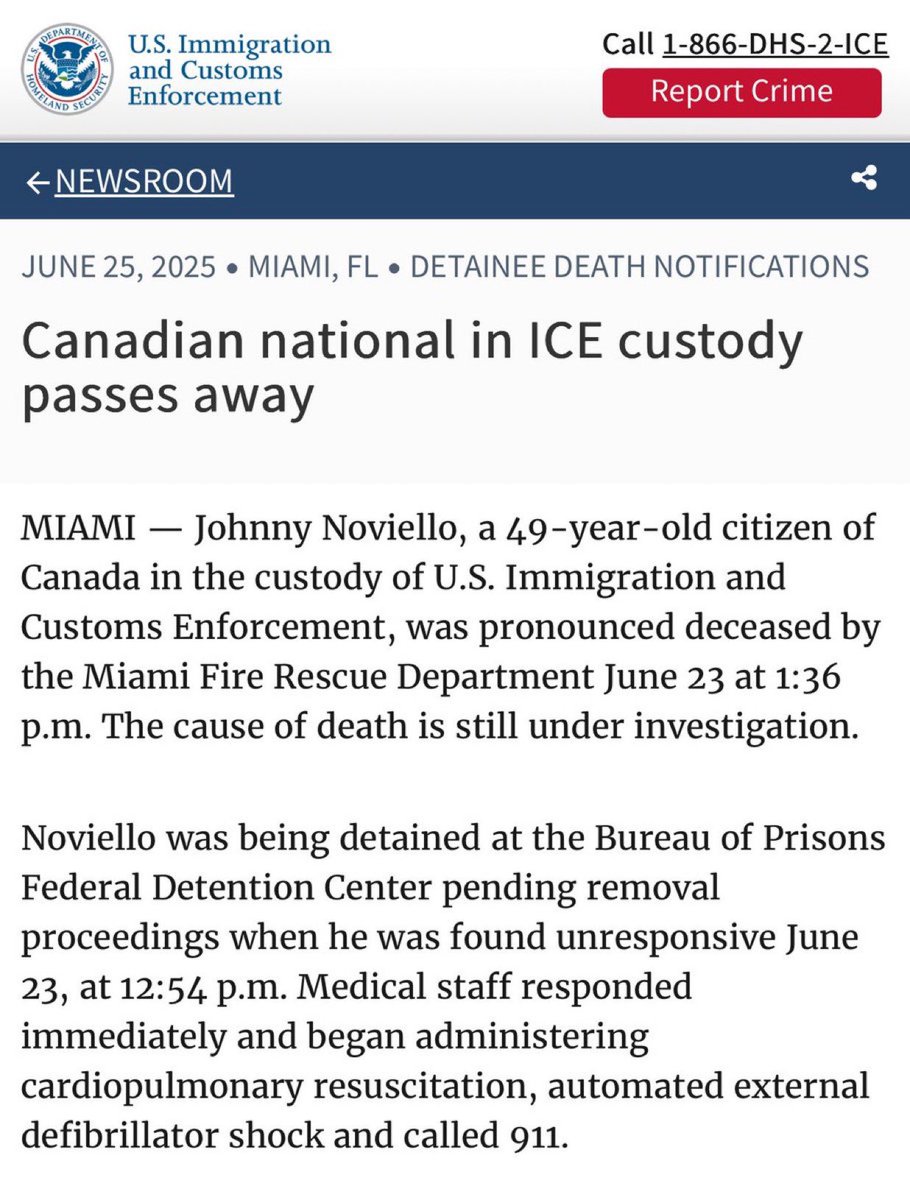BREAKING: Canadian Man Dies in ICE Custody – Outrage Ensues!
Tragic death of Canadian man in ICE Custody Raises Concerns
The recent news of the death of Johnny Noviello, a 49-year-old Canadian man, while in the custody of U.S. Immigration and Customs Enforcement (ICE) in Florida, has sparked widespread concern and calls for accountability regarding the treatment of detainees. This incident, which occurred at a federal detention center in Miami, highlights the critical issues surrounding the conditions of ICE facilities and the health care provided to individuals in detention.
Background on ICE Custody
ICE is responsible for enforcing immigration laws in the United States and operates various detention centers where individuals awaiting immigration proceedings or deportation are held. The agency has faced significant scrutiny over the years due to allegations of poor living conditions, inadequate medical care, and mistreatment of detainees. The death of Johnny Noviello is a stark reminder of these ongoing issues, bringing attention to the urgent need for reform within the immigration detention system.
Incident Details
According to reports, Johnny Noviello was found unresponsive in his detention cell at the Miami facility. Medical staff were summoned and attempted to revive him, but unfortunately, he was pronounced dead shortly thereafter. As of now, the exact cause of death remains undisclosed, leading to further speculation and concern about the health care protocols in place for detainees. Families of individuals in ICE custody often face difficulties obtaining timely information about their loved ones’ health status, which can exacerbate the trauma of detention.
ICE’s Response and Public Reaction
In the wake of this incident, ICE has stated that they are conducting an investigation into the circumstances surrounding Noviello’s death. However, the agency’s credibility has been called into question, especially given the history of similar incidents where the responses have been deemed insufficient or lacking transparency. Advocacy groups and human rights organizations are urging for a thorough and independent investigation, emphasizing the need for accountability and systemic change within ICE operations.
- YOU MAY ALSO LIKE TO WATCH THIS TRENDING STORY ON YOUTUBE. Waverly Hills Hospital's Horror Story: The Most Haunted Room 502
Public reaction has been immediate and passionate, with many expressing outrage over the repeated incidents of deaths in ICE custody. Social media platforms have become a space for individuals to share their condolences and demand justice for Johnny Noviello and others who have suffered similar fates. The hashtags related to immigration reform and detainee rights have gained traction as activists rally for change.
Health Care Concerns in ICE Detention Centers
The death of Johnny Noviello raises critical questions about the quality of health care provided in ICE detention centers. Detainees often report inadequate access to medical care, delays in treatment, and insufficient attention given to chronic health issues. These systemic problems have led to tragic outcomes, as seen in the case of Noviello.
Advocacy organizations have long called for improvements in medical care within these facilities, including the hiring of qualified medical personnel and the establishment of clear protocols for addressing health emergencies. The lack of attention to these issues is not just a humanitarian concern; it poses legal and ethical implications for the U.S. government, which is responsible for the well-being of those in its custody.
Legal Implications and Advocacy
The legal implications surrounding the death of Johnny Noviello could be significant. Families of detainees who die in custody may pursue wrongful death claims against ICE or the federal government, arguing that negligence or a failure to provide adequate medical care contributed to their loved one’s death. These cases can shed light on systemic failures and compel legislative or regulatory changes.
Advocates for immigration reform are using this tragic event as a rallying point to push for comprehensive changes to the immigration detention system. Calls for the abolition of private detention facilities, increased transparency, and better oversight of ICE operations are gaining momentum. The public’s response to the death of Johnny Noviello could be pivotal in driving legislative action aimed at protecting the rights and well-being of all detainees.
The Broader Context of Immigration Reform
Johnny Noviello’s death comes at a time of heightened focus on immigration policy in the United States. With ongoing debates over border security, asylum processes, and the treatment of migrants, this incident underscores the need for compassionate and humane approaches to immigration. The U.S. government must prioritize the health and safety of individuals in detention, ensuring that they are treated with dignity and respect.
As immigration reform continues to be a contentious issue, the tragic death of a detainee like Johnny Noviello serves as a sobering reminder of the human cost of current policies. Advocacy efforts are crucial in ensuring that the voices of detainees and their families are heard and that meaningful changes are made to prevent further tragedies.
Conclusion
The death of Johnny Noviello in ICE custody is a stark and tragic reminder of the urgent need for reform in the immigration detention system. As investigations proceed and advocacy efforts intensify, it is vital to prioritize the health, safety, and dignity of all individuals in detention. The public’s response and the demand for accountability can pave the way for necessary changes to ensure that such incidents do not occur in the future. The legacy of Johnny Noviello must be one that inspires action and compassion in the face of injustice.
By addressing these critical issues, we can work towards a more just and humane immigration system that respects the rights and lives of all individuals.

BREAKING: A Canadian man has died in ICE custody in Florida. His name was Johnny Noviello. He was 49.
ICE claims he was “found unresponsive” at a federal detention center in Miami. Medical staff tried to revive him. He was pronounced dead shortly after. The cause? Still… pic.twitter.com/IjusS6IxpW
— Brian Allen (@allenanalysis) June 26, 2025
BREAKING: A Canadian man has died in ICE custody in Florida. His name was Johnny Noviello. He was 49.
It’s with heavy hearts that we report the tragic news of Johnny Noviello, a 49-year-old Canadian man who recently passed away while in the custody of ICE in Florida. This incident has sparked a wave of concern and outrage among those who follow immigration issues closely. The idea that someone has lost their life while detained raises many questions about the conditions within these facilities and the treatment of individuals in custody.
ICE claims he was “found unresponsive” at a federal detention center in Miami.
According to reports, Johnny was found “unresponsive” at a federal detention center located in Miami. The U.S. Immigration and Customs Enforcement (ICE) has been under scrutiny in recent years for a multitude of reasons, including the treatment of detainees. When incidents like this occur, they remind us of the challenges and risks faced by individuals in the immigration system. The exact circumstances around Johnny’s condition at the time of discovery remain unclear, leading many to seek more information.
Medical staff tried to revive him.
Upon discovering Johnny unresponsive, medical staff at the facility immediately attempted to revive him. It’s a distressing situation for both the staff and the detainees, as the chaos and uncertainty surrounding such emergencies can be overwhelming. Reports suggest that despite their efforts, Johnny was pronounced dead shortly afterward. This raises significant concerns about the medical care available in these detention centers and whether adequate support is provided to those in need.
He was pronounced dead shortly after.
The timeline of events leading to Johnny’s death is troubling. Being pronounced dead shortly after medical staff tried to intervene suggests that there may have been underlying health issues or a lack of proper medical care before the incident occurred. When someone loses their life in such a manner, it inevitably leads to public outcry, demanding accountability and a reevaluation of the protocols in place for the health and safety of detainees.
The cause? Still a mystery.
As of now, the cause of Johnny Noviello’s death remains a mystery. This uncertainty is not uncommon in cases involving fatalities in custody. Often, investigations into the circumstances surrounding such deaths take time, and the results can vary widely. The public is left to wonder about the factors that contributed to this tragic outcome, and many are calling for transparency from ICE regarding the details surrounding Johnny’s death.
The broader implications of Johnny’s death.
Johnny’s story is not just about one individual; it reflects a much larger issue within the immigration detention system. The conditions in these facilities have often been criticized for being inadequate, with many detainees reporting poor healthcare, lack of access to necessary resources, and even mistreatment. This incident serves as a grim reminder that the immigration system needs reform to prevent further tragedies.
When a person dies in custody, it raises questions about the responsibility of the agency overseeing the detention. Many advocates argue that such incidents could be prevented with better medical care and oversight. The call for reform is not just about providing adequate medical attention but also ensuring that the dignity and rights of detainees are respected.
Community response to the tragedy.
The news of Johnny’s death has sparked outrage among community members and activists. Social media has been flooded with messages expressing condolences and demanding justice. Many people are using this moment to raise awareness about the ongoing issues within ICE and the treatment of detainees. Activists are calling for more significant changes in how immigration is handled in the U.S. and are advocating for better conditions for those who find themselves in these detention centers.
This incident serves as a rallying point for those who believe that everyone deserves humane treatment, regardless of their immigration status. The public outcry is not just about Johnny but about the many others who are currently in similar situations. It’s about demanding accountability and ensuring that no more lives are lost due to negligence or inadequate care.
What can be done to prevent future tragedies?
In light of Johnny’s death, many are asking what can be done to prevent similar incidents in the future. Advocates argue for a thorough review of ICE’s policies and procedures regarding detainee health care. This includes ensuring that medical staff are properly trained and that facilities are equipped to handle emergencies effectively.
Additionally, transparency is crucial. Families of detainees and the general public have the right to know what happens within these facilities. Open communication and thorough investigations into deaths in custody can help rebuild trust in the system and ensure that accountability is upheld.
Moreover, there is a growing call for legislative changes to reform the immigration system. Many believe that alternatives to detention should be explored, allowing individuals to reside in communities while their cases are processed, rather than being subjected to the harsh realities of detention.
Looking ahead: The need for systemic change.
Johnny Noviello’s death is a stark reminder of the urgent need for systemic change within the immigration detention system. It highlights the importance of advocating for humane treatment and care for all individuals, regardless of their immigration status. Advocates continue to push for reforms that prioritize the health and well-being of detainees and demand accountability from agencies like ICE.
As the investigation into Johnny’s death unfolds, it’s crucial that the community remains engaged and voices its concerns. Awareness and activism can lead to meaningful change, ensuring that no other individual suffers a similar fate in the future.
In the face of such tragedies, it is essential to remember that behind every statistic and news story is a human being with a life, family, and dreams. Johnny’s story is a call to action for all of us to stand up and advocate for a more just and humane immigration system.

